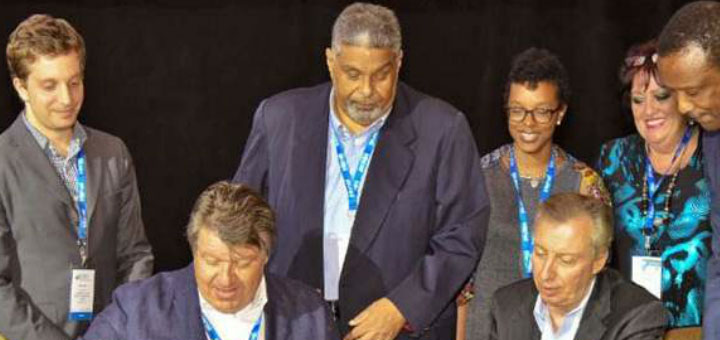The United States Agency for International Development (USAID) Caribbean Clean Energy Program (CARCEP) recently signed a collaboration agreement with the Caribbean Hotel and Tourism Association (CHTA) in a landmark move to bolster energy efficiency in the Caribbean’s hotel sector, the largest electricity consumer sector in the region.
The agreement, which was signed during the official ceremony of the Caribbean Hospitality Industry Exchange Forum (CHIEF) in Puerto Rico, defines the joint actions to be taken to effectively address the sector’s needs primarily in the areas of energy policy reform, research, and capacity development.
This initiative is largely directed at beneficiary countries under USAID CARCEP’s mandate – Antigua and Barbuda, Barbados, Dominica, Grenada, Jamaica, St. Kitts and Nevis, St. Lucia and St. Vincent and the Grenadines. Hotel owners in these nations will be equipped with access to technical tools, training and other resources to help them understand and adopt energy efficiency best-practices to reduce their energy consumption.
Director general and CEO of CHTA, Frank Comito, pledged, through the signing of this agreement, to work closely with USAID CARCEP to advance the work done under the Caribbean Hotel Energy Efficiency and Renewable Energy Action (CHENACT) program funded by the Inter-American Development Bank (IDB) and conducted through CHTA and its regional public sector counterpart organization the Caribbean Tourism Organization.
The agreement underscores CHTA’s commitment to providing program-specific support to USAID CARCEP, regionally and with designated countries, hotels, hotel associations and public sector tourism stakeholders.
“CHTA welcomes the support by the United States government through its clean energy program, to assist Caribbean hotels and countries in becoming more energy efficient. The program brings to the table new tools, resources and training, building upon the foundational work undertaken with hotels through the CHENACT program,” Comito stated.
This agreement symbolizes the start of what will become a wider catalytic benefit for sustainable growth in the region as reductions in energy consumption will deliver environmental benefits as well as improve regional economic competitiveness. There are approximately 2,500 hotels that can profit from this initiative.
“CHENACT touched more than 150 hotels in the region. Through USAID CARCEP, we will be able to significantly expand the number of hotels and countries which can benefit from the program’s resources. Working with CHTA’s network of national hotel and tourism associations throughout the region, and with USAID CARCEP’s team, we look forward to advancing new opportunities for our industry and the region. Sound energy savings initiatives by hoteliers make good business sense and protect our rich natural resources which are an essential part of our touristic appeal,” Comito declared.
Already, the partnership has resulted in the launch of an energy benchmarking tool that followed the agreement signing at the forum. The tool, which was developed by USAID CARCEP, will allow hotel operators to analyze their electricity, fossil fuel and water usage; compare the energy and water intensity with similar hotels in their area; and learn about energy and water efficiency strategies they can employ to reduce hotel operating costs.
“The deployment of this tool in the hotel industry, the biggest economic driver in the region, and the follow-on activities developing knowledge and awareness of energy efficiency will be a game changer. Energy consumption in the region is as much as three times higher per US$1 of GDP generated than other regions of the world, putting this region at a real competitive disadvantage. Both for climatic and economic reasons it is imperative that we reduce fossil fuel consumption and turn those savings into jobs and industry for the region that will drive economic development and future growth,” affirmed USAID CARCEP’s energy efficiency promotion specialist John Marcocchio.
To support ease of access the tool will be housed on CHTA’s website, a strategic decision to ensure sustainability after USAID CARCEP’s implementation period ends in 2020. Hotel owners who are members of CHTA, including those located in non-beneficiary USAID CARCEP nations, will be able to access this tool at no cost, allowing them to gain valuable insight that can ultimately help them learn how best to maximize their return on investments. The tool can highlight abnormal energy and water demands and unearth opportunities for savings and investments.
The signing of the collaboration agreement and the launch of the USAID CARCEP Energy Benchmarking Tool at this year’s CHIEF is key to the success of this initiative. Each year CHIEF, staged by CHTA, attracts a large percentage of hoteliers, association executives and other targeted stakeholders and as such provides a central platform for the introduction to and uptake of these resources. USAID CARCEP and CHTA are urging hoteliers to take advantage of this opportunity.
The next step is the roll out of USAID CARCEP’s training program in each beneficiary country. The first is scheduled to take place in Jamaica in November 2016 and is aimed at demonstrating how to use the tool as well as how to implement energy saving measures at hotels and resorts.


 This information will never be shared to third parties
This information will never be shared to third parties